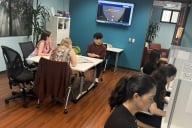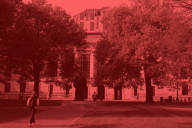You have /5 articles left.
Sign up for a free account or log in.
Labor Day weekend is over, meaning the fall is officially in full swing. Graduate student employees are striking at the University of Michigan, colleges continue to suspend students for partying and multiple institutions have changed their delivery modalities for the term. Additionally, a college professor has died in Argentina, and the University of Alabama is defending its reopening strategy.
University of Michigan faculty, staff and students have criticized their administration for a lack of transparency regarding reopening decisions. Now members of the graduate employees' union at Michigan have opted to strike. The work stoppage is set to begin today and continue for four days, with the potential for reauthorization. The union has been organizing protests and petitions around the university’s COVID-19 response and said any deal with the administration must address concerns about testing, tracing, work from home, support for international students, timeline and funding extensions, subsidies for caregivers, and other issues.
The union is also using the strike to call for the university to divert funds from campus police and cut ties with local law enforcement and federal Immigration and Customs Enforcement. The union said the administration refused to negotiate over police-related demands in recent impact bargaining sessions about COVID-19 response.
The measure to authorize union leaders to call a strike was won with 79 percent of votes.
Some universities have changed their approaches to the fall semester in light of outbreaks at their institutions and campuses nationally.
Two California State University system institutions, San Diego State University and California State University, Chico, have switched the few in-person classes they had to remote. The system was an early adopter of a mostly online fall semester, but it did allow a limited number of classes, in disciplines like nursing and art, to be held in person.
San Diego State will not be closing residence halls, but it announced this weekend that it will put all in-person classes online for four weeks. Those classes will be re-evaluated for face-to-face learning Oct. 5. Over the Labor Day weekend, the university also issued a stay-at-home order for on-campus students. That order is set to end today. The university has had 286 cases of COVID-19.
Those announcements followed last week’s campus closure at Chico State. After an increase in cases among 18- to 24-year-olds in the surrounding area, Chico State announced that it would be closing its residence halls and moving any in-person classes to online. The university was housing 750 students, down from its usual 2,200, according to EdSource.
Reversals in Colleges' Fall 2020 Reopening Plans
Scores of colleges and universities have in recent weeks changed the plans they set last spring for reopening their physical campuses this fall. This tracker and searchable database shows how those changes have unfolded over time.
John Carroll University in Ohio announced on Friday that students will continue to learn remotely for the rest of the fall semester. The university had previously delayed move-in and the start of in-person classes by three weeks.
President Michael Johnson cited early tests of residential students and athletes, revealing 26 cases, and the experiences of other institutions, as reasons for the change.
“Although our positivity rate of 3.02 percent is relatively low, it is categorically higher, by tenfold, than the base rates at campuses that have already opened up and are experiencing problems,” he wrote in a message to campus. “Those same institutions -- many of which you have read about in the news -- have seen significant spikes in positivity rates within seven to ten days of being on campus, resulting in pivots to online learning, illness and isolation of infected students for several weeks, strict quarantining of entire campuses, students returning home, and undue stress on academic and institutional operations and resources.”
The university will focus efforts on allowing students to return in January, he said.
West Virginia University announced that all courses except health courses in which students prepare for a clinical rotation will be online through Sept. 25. A letter from E. Gordon Gee, the president, said, "If we determined the local public health situation was deteriorating, the university would take swift and immediate action. The time has come to do so on the Morgantown campus."
Several institutions handed out punishments this week for student gatherings.
Northeastern University dismissed 11 first-year students after they were discovered gathering together at a hotel in Boston where 818 students are housed. The students were ordered to vacate the hotel within 24 hours and submit to testing at Northeastern. The students have a right to contest their dismissal at an expedited hearing. The dismissed students were part of a Northeastern international learning program that now includes Boston as a site.
St. Bonaventure University suspended 28 students for violating health and safety protocols at a large party. The suspended students are required to leave campus. Though they will remain enrolled in their classes, they are not permitted to return to class until hearings have concluded.
West Virginia University suspended 29 fraternity members this weekend for failing to comply with quarantine and isolation orders. After a member of the Theta Chi fraternity, which is not recognized by WVU, tested positive and was told to isolate, members of the fraternity house were instructed to quarantine. Social media posts and reports alerted the university to a party at the house, resulting in the 29 fraternity members being banned from all classes and campus until further notice.
The State University of New York at Cobleskill suspended 12 students last week for hosting or attending parties that did not comply with state guidance. The university has launched a pooled-saliva testing program for all students following the news.
A college professor in Argentina has died after she collapsed in a virtual class. Paola De Simone was giving an online lecture on 20th-century history for students at the Argentine University of Enterprise in Buenos Aires when she began to struggle for breath and became unresponsive. De Simone had previously posted on Twitter that her coronavirus symptoms were persisting for weeks. She died Wednesday at 46.
The University of Alabama at Tuscaloosa has had more than 1,200 COVID-19 cases among students. Still, university and system officials have defended their strategy. Richard Friend, dean of the College of Community Health Sciences, told Tuscaloosa News, "Nothing has gone wrong" with UA’s approach to testing and other measures.
The UA system also put out a release suggesting it is safer to keep students on campus, where they have resources like testing and protective equipment, than it is to send them home en masse.
While students at St. John’s College of Maryland are learning online from home, students at the Naval Academy in Annapolis, Md., will be moving into their residence halls. The academy set aside 130 rooms for quarantine and will be moving some midshipmen into eight buildings on the St. John’s campus.








